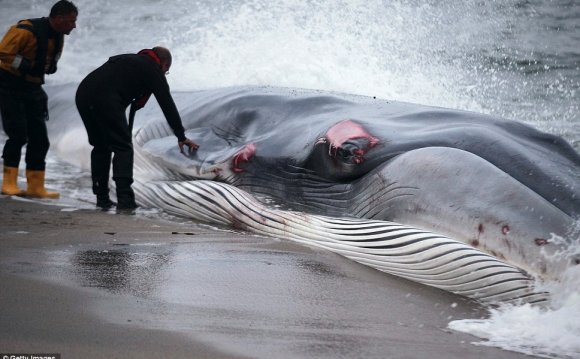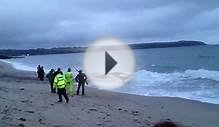
 Records dating back to 1913 show really the only other one to attain UK shores is at Aberaeron in western Wales in 1993. However, specialists believe Blainville's will begin stranding more often in Britain as liquid temperatures increase as a result of climate modification.
Records dating back to 1913 show really the only other one to attain UK shores is at Aberaeron in western Wales in 1993. However, specialists believe Blainville's will begin stranding more often in Britain as liquid temperatures increase as a result of climate modification.
A part of the general public reported the stranding towards the Cornwall Wildlife Trust aquatic Strandings system as a porpoise on December 30 2013.
But when the Network's data officer, Niki Clear, obtained photographs associated with animal, calculating 3.8m (12ft 5in) very long, she recognised it as an evasive Blainville.
Cetacean experts Colin MacLeod at Aberdeen University and Richard C. Sabin from Natural History Museum later on confirmed its identification.
 The 3.8 meter lengthy whale was reported toward Cornwall Wildlife Trust Marine Strandings Network as a porpoise, nevertheless when the Network's information officer obtained photos associated with animal she was dubious it was indeed a whale just recorded two times when you look at the entire regarding the UK
The 3.8 meter lengthy whale was reported toward Cornwall Wildlife Trust Marine Strandings Network as a porpoise, nevertheless when the Network's information officer obtained photos associated with animal she was dubious it was indeed a whale just recorded two times when you look at the entire regarding the UK
Abby Crosby, aquatic Conservation Officer for Cornwall Wildlife Trust, stated: 'We're very pleased that individuals took the problem to report this animal to us, as by recording the carcasses of those creatures marine biologists can gather information regarding the types to assist towards their conservation.
'This carcass was in an unhealthy problem with advanced level decomposition, therefore we would suggest your general public try not to touch any dead marine animals they discover, as they possibly can carry conditions that humans can get.
'It was a sad end because of this amazing whale. Nevertheless by examining these strandings it at the least gives us to be able to research these animals correctly and find out more about them. Plus the even more we realize, the greater we are in a position to combat due to their security.'
Examinations found the whale had been a sub-adult or maturing male Blainville's beaked whale.
Blainville's, similar to beaked whales, are typically discovered off-shore in seas 200m (656ft) to 1, 000m (3, 280ft) along continental racks.
These elusive whales, seldom seen in British seas, have actually distinctive high-arched reduced jaw; the males have a more pronounced arch and a tusk-like tooth within crest of every arch
The species have actually a unique high-arched reduced jaw, with males showing a more obvious arch and tusk-like tooth within crest of each and every arch.
The Cornwall carcass was a 12ft 5in lengthy maturing male which is studied for clues to assist in the conservation of the types.
The whales, named after a nineteenth century French zoologist, have increased arched reduced jaw and lengthy beak.
These are typically darkish to grey in colour, with many tooth rake marks and circular scars across the human body due to cookie cutter shark and parasites, that are gathered with age.
Syd Trudgen, a volunteer for Marine Stranding Network, had been known as toward coastline after the stranding was reported.
Mr Trudgen said: 'It is extremely enjoyable to be a part of an organisation that manages and speaks up for dolphins, seals, whales and turtles.'
Share this article
More about Port Isaac (Cornwall)



